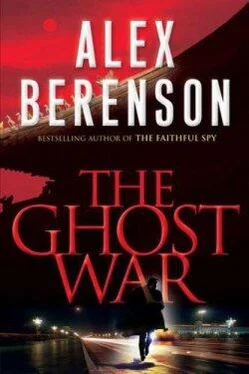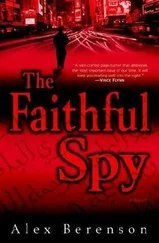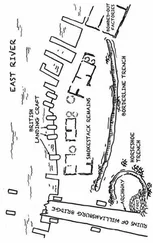“Maybe they caught him holding something classified,” Exley said.
“He was too careful for that,” Tyson said. “His stuff all came shortwave or face-to-face.”
“How important was he, this guy?” Wells said.
“Our most important human source.”
“In North Korea?”
Tyson sighed. “Anywhere. He told us where they hid their nukes.”
“Then maybe it wasn’t the North Koreans.” Wells raised the Budweiser to his lips, filling his mouth with the cool tart liquid.
“How do you mean?”
“Maybe they got tipped by some other hostile service, somebody who wanted to hurt us bad and knew this would do it.”
“Makes perfect sense,” Shafer said. “Somebody gets this, banks it, takes it out now, gives it to the North Koreans when it can really mess us up.”
“I understand, Ellis,” Tyson said irritably. Tyson raised the beer to his mouth, took a tiny sip.
“Not bad, is it, Mr. Tyson?” Wells said.
“I wish I could say yes. Please give it a good home.” Tyson handed the bag to Wells.
“So why are you telling us this?” Exley said.
“For the moment I’m taking the usual steps,” Tyson said. “My staff is examining who had access to the Drafter’s identity or the information he provided. Looking for unusual travel patterns for the officers in the North Korean unit.”
“You’re going to have a lot of people to look at,” Shafer said.
“And it’s no secret that our record in these investigations has been less than stellar.”
“Counterintel doesn’t get the cream of the crop,” Wells said. “Present company excepted.”
“I can’t disagree. It’s far more exciting to be chief of station in Tokyo than stuck in Langley poring over bank records. And anyone with half a brain knows that questioning the loyalty of one’s fellow employees won’t win friends when it comes time for the promotion boards to meet. But you—”
“Have no friends anyway,” Exley said.
“I was going to say that you have shown the ability to work outside the agency’s institutional confines.”
“In other words, no friends,” Wells said.
“I was hoping you might run your own informal inquiry. You’ll have access to everything that the official investigation turns up. If you need subpoenas or extra eyes, I’ll get them for you. In return I ask only that you let me know what you find.”
“Like who got our boat blown to bits twelve hours ago. More black stars.” Every time a CIA employee died on a mission, the agency added a black star to the north wall of the lobby at its original headquarters building. There were now more than eighty stars.
“Exactly, Mr. Wells.”
“You never told us — who was on that boat?”
“Lead agent was named Ted Beck.”
Wells pounded a fist into his open palm. “Dammit.”
“You knew him?” Tyson said.
“He was one of the good guys.” Beck had been one of Wells’s instructors at the Farm — officially called Camp Peary, the CIA’s training center for new recruits — back in the mid-1990s. Beck wasn’t much past thirty, but even then he was bald as a cue ball, tough and strong. He and Wells had shared a love for Pierce’s Pitt Bar-B-Que, a restaurant off Highway 64 where a full rack of ribs cost just $9.95.
Suddenly Wells was irritated at himself for the self-pity he’d indulged in over the last months. He’d sacrificed some, for sure. But Ted Beck — and lots of others — had sacrificed far more.
“You’re the only one who will know what we’re doing?” Exley said.
“Yes. I can give you something in writing. If you feel you need that protection.”
“Not necessary,” Shafer said.
“I’m in,” Exley said.
“Mr. Wells?”
“I’d love to. Especially now that I know who got hit. But I’ve got my own business to take care of. In Afghanistan.”
“Well.” The stands creaked as Tyson stood up. “Good luck with that.”
TEHRAN, IRAN
THE TARMAC AT MEHRABAD AIRPORT, outside Tehran, was a living graveyard of aviation. Baggage carts and tanker trucks jostled for space with planes that had long ago become extinct at more modern airports: 727s, DC-10s, even Russian Tu-154s cast off by Aeroflot. At the end of the terminal sat a four-engine 707, the original Boeing passenger jet, introduced in 1958 and a favorite of aviation buffs. In America, the plane would have been a museum piece. Here it was transportation.
In the midst of this muddle, three Iranian Army jeeps and two Mercedes limousines sped along, horns honking, headlights flashing. The convoy was led by a black Toyota Land Cruiser with tinted windows, a distinctive rising siren, and a single red light on its roof, like a 1960s police cruiser.
The light and siren identified the Toyota as belonging to Vevak, Iran’s fearsome secret police force. As the Toyota approached, baggage handlers jumped back and the Tata tanker trucks made way, their drivers ducking their heads. Avoiding Vevak’s attention was critical to a long and healthy life in Iran.
The Land Cruiser pulled up beside an Airbus A340 painted in the distinctive white-and-gold of Air China, the state-owned Chinese national airline. Four Chinese men stepped out of the first limo and positioned themselves around the second. Only then did the doors of the second Mercedes open. Five men emerged, two bodyguards in suits and three older men wearing the uniforms of the People’s Liberation Army.
The last man to step out was taller than the rest, broad-shouldered, deep into middle age, with short black hair and shining golden sideboards on his green uniform. He was General Li Ping, chief of the People’s Liberation Army and one of the nine members of China’s Politburo Standing Committee, the group that ruled the world’s most populous nation.
Li and his bodyguards strode up the jetway as the Land Cruiser and limousines rolled away. A few minutes later, the Airbus accelerated down the runway, its engines purring, and lifted into the cloudless night.
From the outside, this Airbus looked like the usual Air China A340 widebody that flew the 5,000-mile route from Beijing to Tehran three times a week, down to the stylized red phoenix painted on its tail. But inside, this jet was very different. In place of the usual complement of three hundred seats, it held twenty lie-flat recliners. Near the front of the plane were two staterooms, with king-sized beds, bathrooms, and showers. The jet also came equipped with its own full-time crew from the Chinese air force, as well as three armed guards who lived in a suite at the back and never left the plane unattended.
For despite its markings, this Airbus was far from an ordinary commercial jet. Only the nine men on the Standing Committee had the right to use it. Naturally, China had official state aircraft as well, painted with the country’s five-starred red-and-yellow flag. But the A340 offered advantages for those times when Politburo members wanted to keep their travel plans secret. American spy satellites watched over all the major airports in Iran. But they weren’t looking for an Air China widebody. The jet gave General Li a way to travel invisibly to his meetings in Tehran, meetings he’d been having more and more often.
IN SOME WAYS, China and Iran had every reason to get close. Both nations had long and proud histories. Both had suffered during the twentieth century from invasions and internal strife. Both were now powerful once again, though for different reasons. China’s strength was built on two decades of spectacular economic growth. Iran’s gains were based on oil and the failure of American policy in the Middle East. The Islamic Republic now dominated the Persian Gulf and had the ability to choke off half the world’s oil.
Читать дальше












